Description
Real – world politics had always gone hand in hand with comics and their creators’ own personal perspectives. Yet this was never more creatively expressed than when writer Denny O’Neil and artist Neal Adams paired the liberal Green Arrow with the conservative Green Lantern. While the heroes shared the color green in their names, their respective points of view infused a grey area to problems that, until then, had often been regarded in black and white terms in comics. Green Arrow: “That’s right, Lantern… apologize. Grovel in front of that walking mummy. You call yourself a hero! Chum, you don’t even qualify as a man. You’re no more than a puppet… and the Guardians pull your strings. Listen… forget about chasing around the galaxy! And remember America. It’s a good country… beautiful… fertile… and terribly sick! There are children dying, honest people cowering in fear, disillusioned kids ripping up campuses. On the streets of Memphis a good black man died… and in Los Angeles, a good white man fell. Something is wrong. Something is killing us all! Some hideous moral cancer is rotting our very souls. [Addresses the Guardians, pointing an accusing finger] And you… sitting on your mudball, preening like a smug tomcat. How dare you presume to meddle in the affairs of humanity, when human beings are no more than statistics to you and your crew. [The Guardians ask Green Arrow how he would advise them] Come off your perch. Touch, taste, laugh, and cry! Learn where we’re at… and why!” Green Arrow helps to open Green Lantern’s eyes to the modern-day problems in America, when he shows him the plight of the people living in the tenements of slumlord Jubal Slade. When the Guardians of the Universe observe GL roughing up Slade, they summon him to Oa where he is reprimanded. But against their orders GL returns to Earth and helps the district attorney collect enough evidence to put Slade away. Angry at his insubordination, the Guardians contact Green Lantern, but Green Arrow argues that there are serious problems across America that have previously escaped the attention of Green Lantern. The Guardians confer, and decide to send a representative to accompany Green Lantern and Green Arrow as they go on a journey of discovery. This issue begins a period with Green Arrow co-starring in the series until Green Lantern (Volume 2) #122. Green Arrow is a fictional character, a superhero that appears in comic books published by DC Comics. Created by Morton Weisinger and designed by George Papp, he first appeared in More Fun Comics #73 in November 1941. His real name is Oliver Queen, a billionaire businessman and owner of Queen Industries, as well as a well-known celebrity in his locale of Star City. Sometimes shown dressed like Robin Hood, Green Arrow is an archer who invents trick arrows with various special functions, such as glue arrows, diversions (smoke), net, explosive, time bomb, grappling, fire extinguishing, flash, boomerang, and tear gas arrows, as well as cryonic arrows, and even a kryptonite arrow. At the time of his debut, Green Arrow functioned in many ways as an archery-themed analogue of the very popular Batman character, but the writers at DC subsequently developed him into a voice of left wing and progressive politics very much distinct in character from Batman, with his own supporting cast. Throughout his first twenty-five years, Green Arrow wasn’t a significant hero. In the late 1960s, writer Denny O’Neil, inspired by the character’s dramatic visual redesign by Neal Adams, chose to have him lose his fortune, giving him the then-unique role of a streetwise crusader for the working class and the disadvantaged. In 1970, he was paired with a more law and order-oriented hero, Green Lantern, in a ground-breaking, socially conscious comic book series. Since then, he has been popular among comic book fans and most writers have taken an urban, gritty approach to the character. The character was killed off in the 1990s and replaced by a new character, Oliver’s son Connor Hawke, the second Green Arrow; however, Hawke proved a less popular character, and the original Oliver Queen character was resurrected in the 2001 “Quiver” storyline, by writer Kevin Smith. In 1969, artist Neal Adams decided to update the character’s visual appearance by giving him a goatee and costume of his own design in The Brave and the Bold #85 (August–September 1969). Inspired by Adams’s redesign, writer Dennis O’Neil followed up on Green Arrow’s new appearance by completely remaking the character’s attitude in the pages of Justice League of America #75 (cover-dated November 1969), giving his personality a rougher edge. This revision was explained by having Oliver Queen lose his fortune due to forged documents of him engaging in corruption, and he then became an outspoken advocate of the underprivileged in society and the political left wing. For instance, he once saved a child’s dog playing in a railyard, but instead of feeling satisfaction, he brooded on the larger problem of how the child had nowhere in the city to play safely. In the early 1970s, Green Arrow became a co-feature with Green Lantern (Hal Jordan) in the latter’s series in an acclaimed, but short-lived, series of stories by O’Neil and Adams that dealt with various social and political issues in which Green Arrow spoke for radical change while Green Lantern was an establishment liberal figure, wanting to work within existing institutions of government and law. Where Queen advocated direct action, Hal Jordan wanted to work within the system; where Queen advocated social change, Jordan was more concerned about dealing with criminals. Each would find their beliefs challenged by the other. Queen convinced Jordan to see beyond his strict obedience to the Green Lantern Corps, to help those who were neglected or discriminated against. As O’Neil explained: “He would be a hot-tempered anarchist to contrast with the cerebral, sedate model citizen who was Green Lantern.” The duo embarked on a quest in a beat-up pickup to find America, along the way witnessing the problems of corruption, racism, pollution, and overpopulation confronting the nation. Writer O’Neil even took on current events, such as the Manson Family cult murders, in issues #78–79 (“A Kind of Loving”) where the Black Canary falls briefly under the spell of a false prophet who advocates violence. It was during this period that the most famous Green Arrow story appeared, in Green Lantern (vol. 2) #85–86, when it was revealed that Green Arrow’s ward, Speedy, was addicted to heroin. In his zeal to save America, Oliver had failed in his personal responsibility to Speedy – who would overcome his addiction with the help of the Black Canary, Green Arrow’s then-love interest. This story prompted a congratulatory letter from the mayor of New York, John Lindsay. Unfortunately, the series did not match commercial expectations, and Neal Adams had trouble with deadlines, causing issue #88 to be an unscheduled reprint issue; the series was canceled with issue #89 (April/May 1972). Neal Adams (born June 15, 1941) is an American comic book and commercial artist known for helping to create some of the definitive modern imagery of the DC Comics characters Superman, Batman, and Green Arrow; as the co-founder of the graphic design studio Continuity Associates; and as a creators-rights advocate who helped secure a pension and recognition for Superman creators Jerry Siegel and Joe Shuster. Adams was inducted into the Eisner Award’s Will Eisner Comic Book Hall of Fame in 1998, and the Harvey Awards’ Jack Kirby Hall of Fame in 1999.
A 10 one-hour episodic Green Lantern television series separate from a reboot film is currently in development for HBO Max from Marc Guggenheim and Seth Grahame-Smith with Berlanti Productions producing the series. The series will focus on the Guy Gardner, Jessica Cruz, Simon Baz, and Alan Scott versions of Green Lantern alongside Sinestro and Kilowog.
Green Lantern HBO Max Series Reportedly Darker Than First Expected
HBO Max’s live-action Green Lantern series may still be some time away from its debut – series writer and showrunner Seth Grahame-Smith recently offered an update noting that the series is a “big undertaking” and that it will take “a while” to become a reality – but a new report suggests that when the much-anticipated series does debut, it may just have a darker tone than initially expected. According to The Illuminerdi, the Green Lantern series will be more akin to the Watchmen event series in terms of tone, something that may not only shift what fans expect from the series but how each of the characters is portrayed.
While the report doesn’t have much in the way of details when it comes to this possibly darker tone outside of comparisons to Watchmen, the idea that a Green Lantern series could have a similar tone isn’t difficult to imagine. Even on the pages of comics, many of the characters in Green Lantern have complex personal lives, and they each deal with issues of bigotry, homophobia, and more depending upon those personal lives. And given what we’ve learned about the characters for the series, the live-action versions of those characters will have those things to deal with as well.
Previously shared character descriptions have revealed that each character has something that they are dealing with. Guy Gardner, who will be portrayed by American Horror Story star Finn Wittrock, is described as having “a deep undercurrent of pain” driving his outward alpha male nature. Alan Scott, played by Jeremy Irvine, is the image of heroic perfection, but hiding his homosexuality and even the newest Lantern Bree Jarta has complex struggles as a half-human, half-alien black woman who not only has to deal with her human side but racism and sexism on Earth – as well as her alpha male partner, Guy. Other characters expected in the series, such as Jessica Cruz, and Simon Baz, also have issues of trauma and anxiety, as well as racism to deal with. When you put all of those things together, a darker and more serious tone similar to Watchmen makes sense.
A darker tone would also fit in with what Wittrock recently told Entertainment Weekly about the series being “not your average superhero story”.
“It is really cool how sprawling a storyline it is,” Wittrock explained. “It’s pretty epic. It spans time and space and has something for everyone. It’s not your average superhero story… He takes on a lot of this show. He’s a pretty big part of it. I think it’s an interesting way in [to the story]. It’s not the conventional way in, but I think people might see a side of him they didn’t know was there.”
A debut date for Green Lantern has not yet been set, but the series is expected to debut on HBO Max.
Related products
-
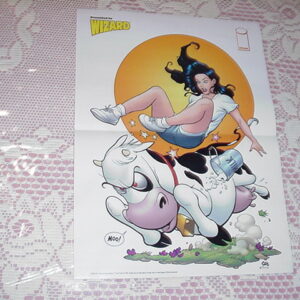
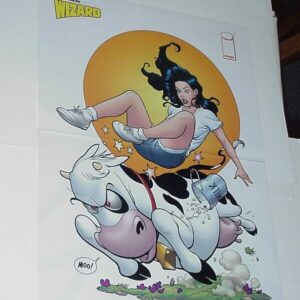
Liberty Meadows Poster # 1 The Cow vs Brandy by Frank Cho University2
$29.99 Add to cart -
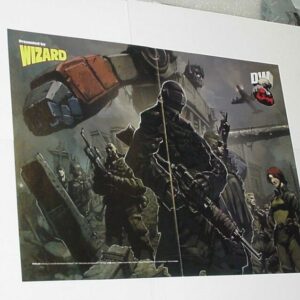

Transformers G.I. Joe Poster Pat Lee GI Optimus Prime Snake Eyes
$39.99 Add to cart -
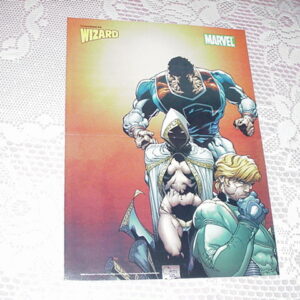
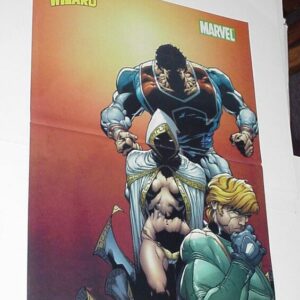
Supreme Power Poster # 1 Joe Quesada Hyperion Doctor Spectrum Squadron
$29.99 Add to cart -
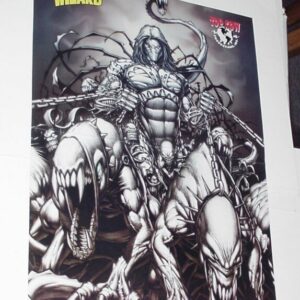
Darkness Poster # 4 Dale Keown Darklings in Chains Pitt Hulk
$29.99 Add to cart


